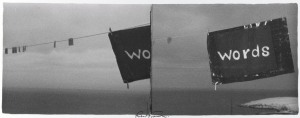accidentally opened a file from the past that seemed related…
The Pleasure of Reading
In other words (than what? than which?) we all of us are readers, all of us writers.
That is a pleasure.
And all of us, always, doing both. Simultaneously.
Speaking of my textbooks (were we?) – information sciences, developmental and behavioral psychology, reference services, librarianship / and the research to the side – physics, evolutionary biology, neuro- and cognitive sciences / my pleasures – novels, poems, stories, others’ blogs, visual, aural, literary artifacts / my relational – wife, children, family, friends, society, culture – gestures and vibes and dialogues and signs / my “self” – sensations, perceptions, formulations of these, reformulations, adjustments and maneuvers.
In other words, at all times, I am reading, even if only my lack of memorable dreams, or pulses and breaths. And writing it all in actions, movements, responses, adjustments of speaking and writing and making.
It is a metaphor, obviously. Perhaps.
Roman Jakobsen purported that “all meaning is a form of translation, and multiple translation (polysemy) is the rule rather than the exception.” (I am translating his text just now into another con-text).
Wolfgang Iser’s (perhaps, anyway insofar as I am translating it here) concept of actual text (text as it is recorded by an author) and virtual text (actual text as read by a reader).
This is an aspect of the deep living pleasures of reading/writing for me.
An author/speaker/artist/scientist/mother/etc. has an urge or sensation – a possibility of action/behavior/message/idea (a virtual text) and translates it through multiple processes and levels of activity through some medium into an actual text/painting/utterance/experiment/recorded idea/sound, etc. There it is in the real world – a physical artifact in time and space – added – if only for a moment. Transforming (simultaneously) its maker into a recipient (translating a now existent text/sound/behavior/gesture/sculpture/experience for him or herself) and if any witness/participant/auditor/recipient or reader is in his or her environment they are simultaneously interacting (via translation through their own tools, language, perceptions, sensations, mood, etc) with the actual text, writing a virtual text (translating) of their own.
And it goes on. And can be done innumerable times, this process, whether using an identical actual text over and over, or simply writing/reading life as it occurs, making it occur.
Paul Ricouer: “stories are models for the redescription of the world.” Possibly. Or at least redescriptions (translations) of models for redescription.
Iser: “the relative indeterminacy of a text allows a spectrum of actualizations…literary texts initiate ‘performances’ of meaning rather than actually formulating meanings themselves…the reader receives it by composing it.”
Language, action, behavior as possibilities rather than certainties.
So that I can encounter with all I’ve encountered/experienced an actual text by psychologist Jerome Bruner translating these very quotes and contents with all he has experienced and translate it with the multiple translations of family life and being a human organism and novels and pains, poems and stories, paintings and laws, translated with data and education, emotions and animals, translating with you and a computer, internet, digits and bits, translating into…
a great pleasure of reading is writing reading
or, “a writer’s (reader’s) greatest gift to a reader (writer) is to help him become a better writer (reader)” – Jerome Bruner (parentheses mine).
literary texts as “epiphanies of the ordinary”
-James Joyce-


